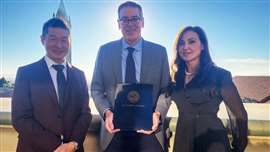Baker Hughes, Berkeley partner on CCUS, other tech
December 13, 2024
Establishing institute for decarbonization of materials
Baker Hughes and the University of California, Berkeley are establishing a research institute to develop climate technologies.
The Baker Hughes Institute for Decarbonization Materials has launched with funding from the energy technology company. The funds, distributed over multiple years, will support Berkeley researchers working to pull chemicals from industrial emission streams and the atmosphere as well as the scientific training and professional development of more than fifty graduate students and postdoctoral researchers across diverse scientific fields.
 eft to right: Chris Pin Harry, VP Technology, Industrial & Energy Technology at Baker Hughes; Professor Jefferey Long, UC Berkeley Professor of Chemistry and Executive Director of the new research center; and Daniela Abate, VP CCUS, Climate Technology Solutions at Baker Hughes. (Image: Baker Hughes)
eft to right: Chris Pin Harry, VP Technology, Industrial & Energy Technology at Baker Hughes; Professor Jefferey Long, UC Berkeley Professor of Chemistry and Executive Director of the new research center; and Daniela Abate, VP CCUS, Climate Technology Solutions at Baker Hughes. (Image: Baker Hughes)
“Despite the fact that climate change is accelerating, we still get most of our energy from burning fossil fuels, which puts carbon dioxide and other chemicals into the air,” says David Harris, the managing director of the Baker Hughes Institute for Decarbonization Materials. “One way to combat this is to construct new materials that can selectively take the carbon dioxide out of air—whether that is from the exhaust at a power plant or the atmosphere.”
As part of the agreement, Baker Hughes will fund collaborative research to develop next-generation materials for a range of energy and industrial applications, including carbon capture, utilization and storage (CCUS), hydrogen, and clean power generation, among others. Baker Hughes will be closely involved from the earliest stages of research to shape the programs based on evolving market and customer needs, as any discoveries may potentially be scaled across the company’s portfolio of climate technology solutions.
“Innovation, collaboration and partnership are critical to building the diversified portfolio of technology solutions necessary to meet the energy demands of today and tomorrow. Partnering with UC Berkeley’s College of Chemistry is an important step forward in our commitment to sustainable energy development,” said Chris Pin Harry, vice president of Technology, Industrial & Energy Technology (IET) at Baker Hughes.
The institute will be led by C. Judson King, Distinguished Professor and UC Berkeley Professor of Chemistry Jeffrey Long, a globally recognized material’s expert who pioneered the use of metal-organic frameworks (MOFs) for adsorbing carbon dioxide and other molecules from industrial emissions streams. Baker Hughes’ funding will support Berkeley researchers, with expertise in materials development and discovery, computational chemistry, advanced characterization, process engineering and techno economics. Chris Pin Harry and Daniela Abate, VP CCUS, Climate Technology Solutions at Baker Hughes, will serve on the institute’s joint steering committee.
Initial research projects will focus on advanced material design, including creating and testing new chemical structures like MOFs, as well as developing gas separation and chemical conversion systems. Additionally, the projects will leverage AI and machine learning to accelerate the discovery and development of improved materials and new technology solutions.
“Our aim is to make materials that not only adsorb gases more efficiently, but also without high energy requirements,” said Professor Long, the institute’s executive director. “As chemists, we know how to adjust materials at the atomic level, but we need partners like Baker Hughes who can scale and industrialize the technology. Lowering emissions is an urgent task, and I am confident that together, we can make scalable, commercially relevant materials that can quickly hit the market and make a difference.”
The partnership builds on Baker Hughes’ wider development of climate technologies, including its work in CCUS with Mosaic Materials direct air capture (DAC) technology. Acquired by Baker Hughes in 2022, Mosaic Materials was born out of Professor Long’s lab at UC Berkeley, and pilot units are currently being tested to accelerate deployment at commercial scale.
MAGAZINE
NEWSLETTER

CONNECT WITH THE TEAM







